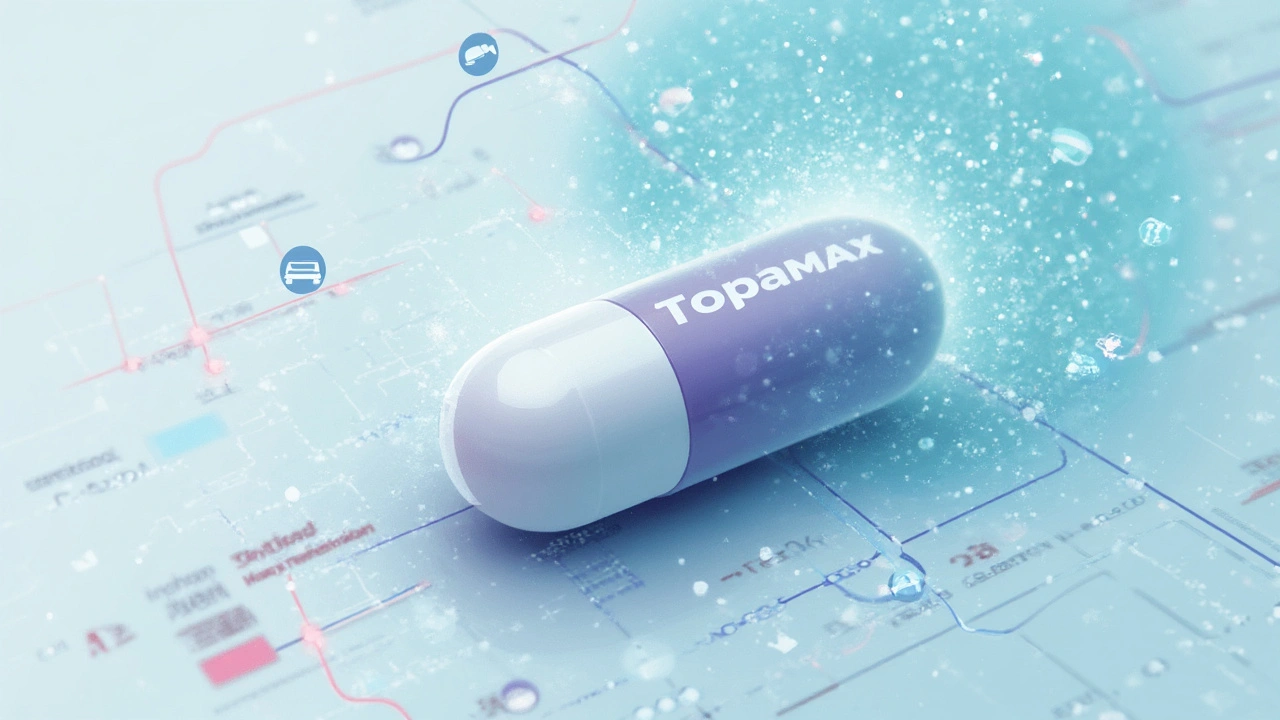Ever heard a friend say her migraine disappeared after taking one little pill, only to find out it came with some curious side effects? That pill might be Topamax, a drug that’s built a reputation for helping with more than just migraines. Doctors in Durban and around the globe have turned to Topamax (the brand name for topiramate) for everything from epilepsy to mood disorders. But is it a miracle fix or just another complicated script?
What is Topamax and What Does It Treat?
Topamax, or topiramate, isn’t a new kid on the pharmacy block. Approved in the late 1990s, it first stepped into the spotlight as a treatment for seizures—helping people with epilepsy by calming electrical activity in the brain. Over time, specialists noticed something interesting: migraine sufferers also started feeling better. By 2004, the US FDA officially greenlit Topamax for migraine prevention. Here in South Africa, it’s a go-to for neurologists dealing with tough headaches or certain cases of epilepsy.
This drug’s broad reach doesn’t end there. Some mental health professionals prescribe it for bipolar disorder or as part of an “off-label” approach for weight loss, especially in people who also binge eat. There’s even buzz about its use in tackling alcohol dependence and PTSD, but those uses sit in a more experimental corner and need way more research.
Why does Topamax work for so many things? Scientists believe it tweaks neurotransmitters in the brain — mainly GABA and glutamate — dialing down the signals that often spark seizures or migraines. And because of the way it shifts brain chemistry, it can sometimes reduce cravings for alcohol or food, explaining its role in those off-label uses.
In migraine prevention, dosing is everything. Most people don’t get full relief from day one. Prescribers start with a low daily dose, then gradually increase over weeks to limit side effects. That gentle “start low, go slow” approach keeps things safer and helps your body adjust. Don’t expect pain relief from an attack once it’s started, though; Topamax is all about reducing how often migraines strike, not stopping one in progress.
Take a look at a few typical uses and doses in this table to make things clear:
| Use | Starting Dose | Maintenance Dose |
|---|---|---|
| Epilepsy (adults) | 25-50 mg/day | 100-200 mg/day (sometimes higher) |
| Migraine Prevention | 25 mg/night | 100 mg/day (divided dose) |
| Bipolar Disorder (off-label) | 25 mg/night | 100-400 mg/day (varies) |
Topamax isn’t suitable for everyone. Allergic reactions are rare but possible, and people with a history of kidney stones, glaucoma, or metabolic acidosis need to be extra cautious. Women of childbearing age should be especially careful—this medication carries a real risk of birth defects if taken during pregnancy. Reliable contraception is non-negotiable while using Topamax if pregnancy is a concern.

What to Expect: Side Effects and Safety Tips
If you ask around, you’ll find Topamax has a bit of a reputation. Some people call it “Dopamax” because of brain fog—yes, slowed thinking and trouble finding words can show up, especially in the first weeks. Not everybody gets fuzzy, but it’s enough to make people nervous about starting. Dry mouth is another common friend, and you might notice tingling in the fingers, toes, or even around the lips. Appetite sometimes drops, and for some, that results in noticeable weight loss—occasionally a welcome plus, especially for folks who battled with weight from other medications.
But the side effect list doesn’t stop there. The most common Topamax side effects, as noted in recent clinical studies, include:
- Paresthesia (tingling sensations)
- Taste changes—fizzy drinks can taste metallic or odd
- Weight loss (around 5-10% of body weight in some users)
- Lack of concentration or confusion
- Tiredness or sleepiness
- Kidney stones (in about 1 in 50 users)
- Blurred vision due to pressure in the eyes
- Low mood or mood swings (rare, but possible)
If you spike a sudden fever, develop back pain, or notice vision changes—especially blurred vision or eye pain—get medical help right away. These can all signal rare but serious Topamax reactions, like metabolic acidosis or acute glaucoma. Doctors usually screen for these risks, but it’s smart to know what warning signs to watch for yourself.
Hydration helps fend off kidney stones. So, if you’re on Topamax, being “water-wise” pays off. Some people keep a 2-liter bottle close at hand all day, sipping steadily. Others find sparkling water soothes dry mouth, but avoid sodas with aspartame—some claim it worsens taste changes.
If you’re planning surgery or strenuous exercise in the Durban heat, double-check with your doctor. Topamax can make people sweat less, raising the risk of overheating.
Another pro tip: never stop Topamax cold turkey. Whether you’re on it for migraines or seizures, quitting suddenly can cause nasty withdrawal symptoms—and with epilepsy, that includes a real risk for seizures. Dose reductions always need a slow, medical plan. Forgetting to take a dose can cause problems too, so daily routines and reminders help keep you safe.
Kids and teens face unique risks with Topamax, including slowed growth or problems with bone strength. That’s why doctors weigh the pros and cons carefully for younger people, and regular check-ups are a must.
Ever wonder how fast side effects show up? Most, like tingling or brain fog, start within days of dose increases and tend to fade with time. Serious ones, like kidney stones or vision problems, can develop later and aren’t always dose-related.
Here are a few practical safety tips if you start Topamax:
- Go slow—dose increases should be gradual, usually every 1-2 weeks.
- Stay hydrated to lower your risk of kidney stones.
- Track changes in mood, weight, and memory—share updates with your doctor.
- Tell your pharmacist about all other medications, including herbal supplements.
- Know the emergency signs: new vision changes, easy bruising, or severe confusion.
- Use reliable contraception if you’re able to become pregnant.
South African medical aid coverage for Topamax can be hit or miss—it’s not the cheapest option out there. Double-check with your scheme before filling a script, and ask about generic topiramate for savings.

Living With Topamax: Real-Life Tips for Success
If your doctor suggests starting Topamax, you might feel hopeful, worried, or both. Realistically, you’ll probably know within two to three months if it’s helping your migraines or epilepsy. The benefits can be huge for people who suffered through headache after headache or couldn’t get reliable seizure control before. But managing the real-life stuff—side effects, routines, family questions—matters just as much as the science behind the drug.
Drinking enough water sounds simple, but it becomes a big part of daily life with Topamax. Some people fill several bottles in the fridge so they remember to drink. Others set reminders on their phones, pairing pills with a specific mealtime or daily ritual.
If brain fog creeps up on you, don’t panic. It sometimes fades over weeks, especially if you take dose adjustments slowly. Making lists or using sticky notes can help keep your thoughts clear while your body adjusts. If school or work require lots of mental muscle (think teachers, lawyers, or even taxi drivers in Durban’s rush hour), you’ll want to discuss dosing schedules with your doctor.
Weight loss on Topamax isn’t automatic, but it does happen for many—especially those sensitive to appetite changes. If you start losing weight without trying, check your food intake and tell your doctor. Sometimes, nutrition counseling or extra snacks are needed to keep things healthy, rather than letting unwanted weight drop off too fast.
The food and drink changes are almost legendary. Some people say carbonated drinks lose their fizz or taste metallic, and that eating certain fruits (like grapefruit or lemons) perks up their taste buds. If you notice your sense of taste changes, try mixing up meals and drinks to keep things enjoyable.
If you’re into sports or plan on running the Comrades Marathon, know that sweating less on Topamax could put you at greater risk for heatstroke. Stay cool, skip peak midday races, and consider lighter training on really hot days. And remember—alcohol isn’t your friend on this medication. Some get tipsier faster, and mixing Topamax with booze can make side effects far worse. If drinking is part of your social life, talk with your prescriber before starting the drug—not after the hangover hits.
Medication schedules aren’t always simple. If you miss a dose, take it as soon as you remember unless it’s nearly time for the next one—then just skip. Double dosing to “catch up” is a big no-no, as it raises the risk of side effects.
Some people try Topamax and find the side effects just aren’t worth it. That’s OK. The key is honest feedback to your healthcare team, tracking what change you feel week by week. There are other migraine preventers and epilepsy meds out there if Topamax isn’t a match.
If you’re a woman thinking about pregnancy, plan ahead. Topamax increases the risk of cleft palate and other birth defects, so switching to a different medication or stopping safely is a must before you try to conceive. Always talk openly with your doctor about family planning long before it becomes real.
Finally, don’t let the stories from others scare you off—or swallow every miracle claim just because it’s flashy. Topamax is a tool, not a magic bullet, and your body’s reaction is unique. With realistic expectations, honest check-ins, and a little Durban sun, you can work with your healthcare team to get the most out of this powerhouse medication—side effects and all.


Rin Jan
July 18, 2025 AT 16:50I've gotta say, reading through all the uses and warnings about Topamax, it really hits home how complicated this stuff can be.
People think a pill is just a pill, but no, this one affects so many different body functions and even your mood sometimes, I mean seriously.
And the side effects list? Honestly, it kinda scares me how easy it is to overlook things like memory problems or feeling dizzy just because you're desperate for relief from migraines or seizures.
The way the post breaks down who really should be cautious, like pregnant women or people with kidney stones, is super useful though.
We often just jump on meds, but maybe we all need a bit more info first, right?
That’s why posts like this one are needed. Staying informed is half the battle in managing our own health safely.
akash chaudhary
July 19, 2025 AT 12:33First off, let me correct a misconception right away: Topamax is not just a migraine medication, it's an anticonvulsant, and that distinction matters. People who advocate prescribing it without fully understanding the pharmacodynamics are doing a disservice.
The article mentioned usage for seizures and migraines, but failed to highlight that dosage and administration protocols can vary dramatically, making user guidance incomplete.
Side effects like cognitive impairment aren’t trivial and can't be simply brushed off. They’re often dose-dependent but still significant.
So anyone telling you Topamax is a 'safe and easy fix' is oversimplifying, and frankly, spreading misinformation.
Remember to always double check multiple sources, preferably peer-reviewed research, instead of blindly trusting superficial overviews like this one.
No shortcuts to safe treatment, folks.
Adele Joablife
July 21, 2025 AT 14:13Honestly, I think the safety concerns around Topamax are not emphasized enough for some patients. This med can be life-changing, sure, but it also has a reputation for causing mood swings or cognitive dulling that some people just aren't prepared for.
The discussion post hits some key points but I would have liked more on who exactly should avoid it and why, beyond just vague warnings.
Also, the mention of tips for safer treatment is great, but it’s pretty generic advice. We need more practical, detailed strategies that patients can realistically implement day-to-day, because migraines are debilitating enough without added worry.
Overall, I appreciate the balanced take but this topic deserves more depth.
Topamax isn’t a magic cure, but with the right approach, it might just be a helpful tool in the bigger picture.
kenneth strachan
July 22, 2025 AT 18:00Okay real talk, I get why people are so hyped about Topamax when it reduces migraine frequency, but let’s not pretend it’s some miracle drug.
Side effects can hit like a ton of bricks, and some people straight up claim it wrecked their memory or concentration.
I mean, has anyone here felt like a complete fogbrain after starting this? Because I sure did.
Sure, docs say 'tolerable' but that’s doctor speak for ‘deal with it or quit’ sometimes.
So yeah, maybe this post needs a warning that matches the actual struggle some patients face.
The way some folks treat it like candy, it’s wild.
Mandy Mehalko
July 29, 2025 AT 02:46Hi everyone! I just wanted to say I’ve been on Topamax for almost a year now, and honestly, it’s been a mix of ups and downs.
I did have some cognitive fog in the beginning, but with time it lessened, and my migraines have definitely reduced in frequency.
The article’s advice on patience and gradual dosing is so on point because rushing things really made side effects worse for me.
Also, staying hydrated and monitoring my mood helped a lot.
I’d encourage anyone starting this medicine to keep notes and talk openly with their doctor.
It’s definitely not perfect, but it might just make a big difference if handled carefully.
Bryan Kopp
July 30, 2025 AT 20:26From my standpoint, living here in the US, there is sometimes a tendency to over-medicate without sufficient education about risks.
Topamax, while clinically effective, absolutely requires informed consent especially given the neurological side effects which can affect anyone differently.
What this article does well is highlight the practical side of who benefits and who should exercise caution.
However, the part about usage tips could have been expanded to include lifestyle changes or alternative therapies alongside medication.
One should always consider all options before settling.
Treatment shouldn’t just be about pills; it’s about holistic care.
Tim Giles
August 3, 2025 AT 07:46Though the post offers a comprehensive overview, it might warrant a deeper dive into the pharmacological mechanisms of topiramate that underpin its side effects and therapeutic benefits.
For instance, its action on sodium channels and GABA receptors plays a key role in seizure control but also contributes to cognitive slowing.
Patients often wonder why they experience these adverse effects, and a scientific explanation could alleviate anxieties.
Additionally, the article could discuss the importance of titrating doses to balance efficacy against toxicity.
Understanding the delicate balance involved here can empower patients.
Engagement with healthcare professionals who can tailor the treatment specifically is crucial for optimal outcomes.
Peter Jones
August 5, 2025 AT 15:20I really appreciate the balanced tone of this post. It doesn’t shy away from side effects but also doesn’t demonize the medication.
As someone who sees many different approaches to migraine treatment, I think safer, smarter use means education paired with monitoring.
It’s important for patients to know what to expect and for doctors to customize treatment plans.
Also, combining Topamax with lifestyle modifications—like diet and sleep hygiene—can amplify benefits and reduce reliance on drugs.
So, this article is a good stepping stone toward that dialogue.
Hopefully, it encourages people to ask informed questions rather than blindly accepting prescriptions.
Gerard Parker
August 7, 2025 AT 22:53Just a heads up for anyone diving into Topamax treatment: don’t underestimate the impact on mental clarity. I’ve seen clients struggle with memory lapses and slowed thinking, which can trigger frustration.
It’s crucial to have regular follow-ups and to consider dose adjustments if cognitive side effects become intolerable.
The article is useful but borderline optimistic about tolerability.
Keep in mind that what’s safe for some might be challenging for others.
Also, hydration, dietary adjustments, and avoiding alcohol can improve tolerance.
Discuss these strategies with your doctor to optimize your experience.
Michelle Abbott
August 9, 2025 AT 02:40This post feels a bit repetitive and could use more depth on the neurological side effects, which are often minimized in mainstream posts. 'Memory problems' is an understatement for many, and the lack of detailed intervention advice is a glaring omission.
Plus, there’s no mention of long-term effects or withdrawal risks, which are critical for anyone considering Topamax.
If you’re going to discuss a drug with such a wide set of effects, don’t keep it surface-level.
Patients deserve honesty about the challenges and the complexities involved.
Better informed means better prepared, and that’s what’s missing here.
Heather Jackson
August 15, 2025 AT 05:53I thought this post was quite informative overall, but I would like to emphasize talking openly with your healthcare provider about any side effects you experience.
Many people are hesitant to say if they feel worse on a medication because they worry about disappointing their doctor.
Don’t be afraid to express concerns or ask for dose changes and alternative therapies.
The post’s point about safer treatment is vital, and that starts with communication.
So keep a symptom diary and be proactive.
It might feel dramatic, but taking charge of your health is empowering, especially with something as serious as migraines or seizures.